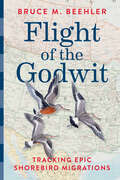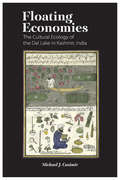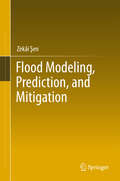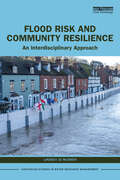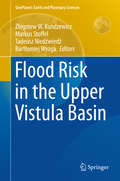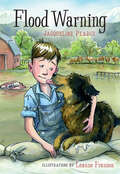- Table View
- List View
Flight Paths: A Field Journal of Hope, Heartbreak, and Miracles with New York's Bird People (Excelsior Editions)
by Darryl McGrathFinalist for the 2017 da Vinci Eye presented by Hopewell PublicationsIn the late 1970s, the bald eagle and the peregrine falcon were heading toward extinction, victims of the combined threats of DDT, habitat loss, and lax regulation. Flight Paths tells the story of how a small group of New York biologists raced against nature's clock to bring these two beloved birds back from the brink in record-setting numbers.In a narrative that reads like a suspense tale, Darryl McGrath documents both rescue projects in never-before-published detail. At Cornell University, a team of scientists worked to crack the problem of how to breed peregrine falcons in captivity and then restore them to the wild. Meanwhile, two young, untested biologists tackled the overwhelming assignment of rebuilding the bald eagle population from the state's last nesting pair, one of whom (the female) was sterile.McGrath interweaves this dramatic retelling with contemporary accounts of four at-risk species: the short-eared owl, the common loon, the Bicknell's thrush, and the piping plover. She worked alongside biologists as they studied these elusive subjects in the Northeast's most remote regions, and the result is a story that combines vivid narrative with accessible science and is as much a tribute to these experts as it is a call to action for threatened birds.Readers are taken to a snow-covered meadow as an owl hunts her prey, a loon family's secluded pond, an eagle nest above the Hudson River, and a mountaintop at dusk in search of the Bicknell's thrush, one of the planet's rarest birds. Combining a little-known chapter of New York's natural history with a deeply personal account of a lifelong devotion to birds, Flight Paths is not only a story of our rapidly changing environment and a tribute to some of New York's most heroic biologists, but also a captivating read for anyone who has ever thrilled to the sight of a rare bird.
Flight Plans: A Bird's Eye View of Life
by Maryjo Koch* "The world is your birdbath."* "Great ideas need landing gear as well as wings." * "Success can take a long time to hatch." * Distinguished naturalist painter Maryjo Koch offers a bird's-eye view of life in this beautiful and inspirational keepsake.For millions of bird lovers, and anyone who has ever had to alter their flight plans, Maryjo Koch offers captivating, beautifully detailed watercolor paintings of more than 25 different bird species in this uplifting keepsake that pairs Koch's avian images with inspiring prose about soaring above difficulties and living life to the fullest. Koch delivers gentle humor and timeless wisdom based on observations of her finely flocked and feathered friends.
Flight Ways
by Thom Van DoorenA leading figure in the emerging field of extinction studies, Thom van Dooren puts philosophy into conversation with the natural sciences and his own ethnographic encounters to vivify the cultural and ethical significance of modern-day extinctions. Unlike other meditations on the subject, Flight Ways incorporates the particularities of real animals and their worlds, drawing philosophers, natural scientists, and general readers into the experience of living among and losing biodiversity.Each chapter of Flight Ways focuses on a different species or group of birds: North Pacific albatrosses, Indian vultures, an endangered colony of penguins in Australia, Hawaiian crows, and the iconic whooping cranes of North America. Written in eloquent and moving prose, the book takes stock of what is lost when a life form disappears from the world -- the wide-ranging ramifications that ripple out to implicate a number of human and more-than-human others. Van Dooren intimately explores what life is like for those who must live on the edge of extinction, balanced between life and oblivion, taking care of their young and grieving their dead. He bolsters his studies with real-life accounts from scientists and local communities at the forefront of these developments. No longer abstract entities with Latin names, these species become fully realized characters enmeshed in complex and precarious ways of life, sparking our sense of curiosity, concern, and accountability toward others in a rapidly changing world.
Flight Ways: Life and Loss at the Edge of Extinction
by Thom Van DoorenA leading figure in the emerging field of extinction studies, Thom van Dooren puts philosophy into conversation with the natural sciences and his own ethnographic encounters to vivify the cultural and ethical significance of modern-day extinctions. Unlike other meditations on the subject, Flight Ways incorporates the particularities of real animals and their worlds, drawing philosophers, natural scientists, and general readers into the experience of living among and losing biodiversity.Each chapter of Flight Ways focuses on a different species or group of birds: North Pacific albatrosses, Indian vultures, an endangered colony of penguins in Australia, Hawaiian crows, and the iconic whooping cranes of North America. Written in eloquent and moving prose, the book takes stock of what is lost when a life form disappears from the world -- the wide-ranging ramifications that ripple out to implicate a number of human and more-than-human others. Van Dooren intimately explores what life is like for those who must live on the edge of extinction, balanced between life and oblivion, taking care of their young and grieving their dead. He bolsters his studies with real-life accounts from scientists and local communities at the forefront of these developments. No longer abstract entities with Latin names, these species become fully realized characters enmeshed in complex and precarious ways of life, sparking our sense of curiosity, concern, and accountability toward others in a rapidly changing world.
Flight Ways: Life and Loss at the Edge of Extinction (Critical Perspectives on Animals: Theory, Culture, Science, and Law)
by Thom van DoorenA leading figure in the emerging field of extinction studies, Thom van Dooren puts philosophy into conversation with the natural sciences and his ethnographic encounters to vivify the cultural and ethical significance of modern-day extinctions. Unlike other meditations on the subject, Flight Ways incorporates the particularities of real animals and their worlds, drawing philosophers, natural scientists, and general readers into the experience of living among and losing biodiversity.Each chapter of Flight Ways focuses on a different species or group of birds: North Pacific albatrosses, Indian vultures, an endangered colony of penguins in Australia, Hawaiian crows, and the iconic whooping cranes of North America. Written in eloquent and moving prose, the book takes stock of what is lost when a life form disappears from the world—the wide-ranging ramifications that ripple out to implicate a number of human and more-than-human others. Van Dooren intimately explores what life is like for those who must live on the edge of extinction, balanced between life and oblivion, taking care of their young and grieving their dead. He bolsters his studies with real-life accounts from scientists and local communities at the forefront of these developments. No longer abstract entities with Latin names, these species become fully realized characters enmeshed in complex and precarious ways of life, sparking our sense of curiosity, concern, and accountability toward others in a rapidly changing world.
Flight into Fear (Duncan Kyle Collection)
by Duncan KyleA dynamic race with death high above the frozen North Atlantic.At eight hundred feet the Atlantic waves looked huge; they also looked terrifyingly near, rearing up hungrily as though to lick at our feet, and still there was no sign from the engines that fuel was being burned.I switched on the radio. ‘Mayday, Mayday. Golf Alpha Lima Zulu, ditching in the North Atlantic approximately seventy miles south of Cape Farewell. Mayday, Mayday…’The surging Atlantic was only five hundred feet below us now, white foam on angry black waves, and still the Tiger plunged downward…A suspense thriller of pure adrenaline and excitement, Flight Into Fear is a nerve-shredding experience, perfect for fans of Hammond Innes, Desmond Bagley and Len Deighton.Praise for Duncan Kyle‘Brilliant … the outstanding thriller-writer discovery of the seventies’ Evening News‘Highly readable … never a dull moment’ Daily Mail‘Stunningly dramatic’ Evening Standard
Flight of the Godwit: Tracking Epic Shorebird Migrations
by Bruce M. BeehlerSoar across 46 North American territories to uncover the secrets of 7 magnificent shorebirds, the world&’s greatest nonstop travelersAn immersive travelogue that belongs on every birder's bookshelf, with 30 gorgeous black-and-white illustrations and a birdwatching species checklistFlying more than 8,000 miles from Alaska to eastern Australia without stopping to eat or rest, the Bar-tailed Godwit holds the record for the longest nonstop migration of any land bird in the world. Flight of the Godwit invites readers on ornithologist Bruce M. Beehler's awe-inspiring journey in search of North America's largest and farthest-flying shorebirds. Driving 35,000 miles between 2019 to 2023, Beehler sought birds he dubs the "Magnificent Seven": Hudsonian GodwitBar-tailed GodwitMarbled GodwitWhimbrelLong-billed CurlewBristle-thighed CurlewUpland SandpiperBeehler interweaves colorful fieldwork stories and rich details on local culture with the natural history and biology of shorebirds—including evolution, the physics of migration, orientation, homing, foraging, diet, nesting, parental care, wintering, staging, elusive "super-migrators," and the importance of conservation efforts.With authoritative prose and 30 beautiful black-and-white illustrations from artist Alan T. Messer, the book journeys through 37 states and 9 Canadian provinces from Texas to Alaska to Canada's High Arctic. Flight of the Godwit is a captivating adventure and a tribute to remarkable birds and birding itself.
Flight of the Hummingbird
by Wangari Maathai The Dalai Lama Michael Nicoll YahgulanaasHummingbirds have long been a symbol of wisdom and courage. In this charming story, a hummingbird makes a valiant effort to put out a raging fire that threatens her forest home - trip after trip, her beak is filled each time with just a drop of water. Her efforts show her woodland companions that doing something - anything - is better than doing nothing at all. The hummingbird parable, which originates with the Quechuan people of South America, has become a talisman for environmentalists and activists worldwide committed to making meaningful change. This retelling, enlivened by Michael Nicoll Yahgulanaas' fabulous Haida-manga illustrations, is suitable for all ages of would-be activists. Although environmental responsibility often seems like an overwhelming task, The Flight of the Hummingbird shows how easy it is to start and how great the effect could be if everyone just did what they could.
Flights Against the Sunset: Stories that Reunited a Mother and Son
by Kenn KaufmanAt age sixteen, Kenn Kaufman left home to travel the world in search of birds. Now a grown man and a renowned ornithologist, he has come back to visit his ailing mother and explain to her what drove his obsession with bird life. His explanation forms a series of interlocking tales from the frontier where the world of birds intersects with the world of the humans who pursue them. The stories range over settings from Alaska to Africa, from trackless jungles to parking lots. They delve into subjects from first dates to last rites, from imagination and desire to sleep deprivation, from poignant encounters with eternal mysteries to comical brushes with biker gangs and secret agents. But as the stories unfold, the ornithologist comes to realize that he can still learn from his mother some things about life and even about the meaning of birds. Flights Against the Sunset brings together nineteen essays, mostly adapted from Kaufman's long-running column in Bird Watcher’s Digest. They weave an original story that examines how we communicate about our passions with those who do not share the same interests and how to celebrate the world of infinite possibilities and wonder.
Flights of Fancy: Birds in Myth and Legend
by Peter TateThe perfect bedside companion for every bird-watcher and nature lover, inside Flights of Fancy you'll find: Cranes--"Don't promise the crane in the sky, but give the titmouse in your hand." Russian proverb. Magpies--"One for sorrow, two for joy..." Traditional English rhyme. Owls--"The owl shrieked at thy birth, an evil sign." Shakespeare, Henry VI, Part III. Peacocks--"The peacock is ashamed of its large black feet." Medieval Persian tradition. Ravens--"When the raven tried to bring fire to the world, ash turned its feathers black." Cherokee Indian legend. Swans--"Sewing a swan's feather into your husband's pillow will keep him faithful." British superstition, and much more.
Flint Fights Back: Environmental Justice and Democracy in the Flint Water Crisis (Urban and Industrial Environments)
by Benjamin J. PauliAn account of the Flint water crisis shows that Flint's struggle for safe and affordable water is part of a broader struggle for democracy.When Flint, Michigan, changed its source of municipal water from Lake Huron to the Flint River, Flint residents were repeatedly assured that the water was of the highest quality. At the switchover ceremony, the mayor and other officials performed a celebratory toast, declaring “Here's to Flint!” and downing glasses of freshly treated water. But as we now know, the water coming out of residents' taps harbored a variety of contaminants, including high levels of lead. In Flint Fights Back, Benjamin Pauli examines the water crisis and the political activism that it inspired, arguing that Flint's struggle for safe and affordable water was part of a broader struggle for democracy. Pauli connects Flint's water activism with the ongoing movement protesting the state of Michigan's policy of replacing elected officials in financially troubled cities like Flint and Detroit with appointed “emergency managers.”Pauli distinguishes the political narrative of the water crisis from the historical and technical narratives, showing that Flint activists' emphasis on democracy helped them to overcome some of the limitations of standard environmental justice frameworks. He discusses the pro-democracy (anti–emergency manager) movement and traces the rise of the “water warriors”; describes the uncompromising activist culture that developed out of the experience of being dismissed and disparaged by officials; and examines the interplay of activism and scientific expertise. Finally, he explores efforts by activists to expand the struggle for water justice and to organize newly mobilized residents into a movement for a radically democratic Flint.
Flip Float Fly: Seeds On The Move
by Joann Early MackenThis book shows how seeds travel from one place to another.
Flo & Wendell Explore
by William WegmanWilliam Wegman channels his love of nature in an outdoor adventure for campers of all agesFlo thinks the family’s last vacation together was just grand. Her little brother, Wendell, thinks it was absolutely terrible. So, being the good big sister that she can sometimes be, Flo has agreed to take Wendell on his very own camping adventure. They’re going to go canoeing, fishing, and hiking—well, as best they can in the comfort of their neighborhood.In this follow-up to Flo & Wendell, Wegman’s celebrated return to children’s books, he again combines his signature Weimaraner photography with whimsical paintings. The result is a satisfying and kid-friendly picture book that will remind readers that camping is always an adventure—even when it’s close to home.
Float
by Daniel Miyares<p>A boy’s small paper boat—and his large imagination—fill the pages of this wordless picture book, a modern-day classic from the creator of Pardon Me! that includes endpaper instructions for building a boat of your own. <p>A little boy takes a boat made of newspaper out for a rainy-day adventure. The boy and his boat dance in the downpour and play in the puddles, but when the boy sends his boat floating down a gutter stream, it quickly gets away from him. <p>So of course the little boy goes on the hunt for his beloved boat—and when the rain lets up, he finds himself on a new adventure altogether. <p>This seemingly simply story from Daniel Miyares is enriched with incredible depth and texture that transcend words.</p>
Float (Float #1)
by Laura MartinFrom the critically acclaimed author of the Edge of Extinction series comes this fast-paced, action-packed, and heartfelt adventure about a group of kids with uncontrollable abilities, perfect for fans of Gordon Korman, Lisa McMann, and Dan Gutman!Emerson can float…he just can’t do it very well.His uncontrollable floating is his RISK factor, which means that he deals with Reoccurring Incidents of the Strange Kind. The last place Emerson wants to be is at a government-mandated summer camp for RISK kids like him, so he’s shocked when he actually starts having fun at camp—and he even makes some new friends.But it’s not all canoeing and capture the flag at Camp Outlier. The summer of fun takes a serious turn when Emerson and his friends discover that one of their own is hiding a deadly secret that puts all of their lives in danger.It’s up to the Red Maple boys to save themselves—and everyone like them.
Floating Economies: The Cultural Ecology of the Dal Lake in Kashmir, India
by Michael J. CasimirIn the Himalayas of the Indian part of Kashmir three communities depend on the ecology of the Dal lake: market gardeners, houseboat owners and fishers. Floating Economies describes for the first time the complex intermeshing economy, social structure and ecology of the area against the background of history and the present volatile socio-political situation. Using a holistic and multidisciplinary approach, the author deals with the socioeconomic strategies of the communities whose livelihoods are embedded here and analyses the ecological condition of the Dal, and the reasons for its progressive degradation.
Floating: A Life Regained
by Joe MinihaneThe British journalist explores self-healing in wild waters across the UK—from Yorkshire to Jura and Wales—in this &“genuine and refreshing nature memoir&” (Kirkus Reviews). Following the example of naturalist Roger Deakin in his classic memoir Waterlog, journalist Joe Minihane becomes obsessed with wild swimming and its restorative qualities. Putting one arm over the other, sometimes resting on his back, he begins to confront his personal demons while rekindling old friendships and forging new ones. Through Minihane&’s thoughtful description, the act of swimming becomes both strange and beautiful as the wild water puts him in touch with nature and himself. From Hampstead to Yorkshire, from Dorset to Jura, from the Isles of Scilly to Wales, Floating is a love letter to different wild stretches of water. But it also captures Minihane&’s struggle to understand his life and move forward. Steeped in the anti-authoritarian and naturalistic spirit of Roger Deakin, Minihane celebrates the joy of taking time out to feel better.
Flock Together: Connecting people of colour to nature – AS SEEN ON TV
by Nadeem Perera Ollie OlanipekunAS SEEN ON BBC ONE'S THE ONE SHOW'Nature is a universal resource. For too long Black, Brown and people of colour have felt unwelcome and marginalised in spaces that should be for everyone.' -Flock TogetherNature is a powerful source of creativity, inspiration and healing; however, it has not always felt like a safe space for people of colour. Flock Together is here to change that, by inspiring everyone, regardless of race, religion or economic status, to build their relationship with the outdoors and embrace all that nature has to offer.Founded by Ollie Olanipekun and Nadeem Perera in summer 2020, Flock Together is the UK's first birdwatching collective for people of colour. Ollie and Nadeem share a mutual love of nature - it is their outlet when faced with neglect and prejudice, it is a place for deep thought and discovery, and it is the foundation on which their friendship and community is built. Part memoir, part manifesto, Outsiders is Flock Together's call-to-action. Divided into six parts, each chapter focuses on a key pillar in the Flock's mission:1. Make Nature a Must explores the contrast between urban and rural lifestyles. How does the urban environment disconnect the individual from nature? How is nature beneficial to us all? 2. Challenging Preconceptions shows the complexities people of colour face when they are stereotyped. How can we change these preconceptions? 3. Nature as My Healer assesses the systemic issues impacting the mental health of people of colour. How can nature help mitigate this? 4. Building a Community offers guidance to building your own community. How can a community bring systemic change? 5. Who Runs Nature? outlines what we can do to benefit nature. How do communities around the world cooperate with the ecosystem and how can this be introduced more to the western world? 6. Creative Mentorship looks at the obstacles young people of colour face when shut out of particular spaces. How does mentorship help reclaim those spaces?
Flock Together: Connecting people of colour to nature – AS SEEN ON TV
by Nadeem Perera Ollie OlanipekunAS SEEN ON BBC ONE'S THE ONE SHOW'Nature is a universal resource. For too long Black, Brown and people of colour have felt unwelcome and marginalised in spaces that should be for everyone.' -Flock TogetherNature is a powerful source of creativity, inspiration and healing; however, it has not always felt like a safe space for people of colour. Flock Together is here to change that, by inspiring everyone, regardless of race, religion or economic status, to build their relationship with the outdoors and embrace all that nature has to offer.Founded by Ollie Olanipekun and Nadeem Perera in summer 2020, Flock Together is the UK's first birdwatching collective for people of colour. Ollie and Nadeem share a mutual love of nature - it is their outlet when faced with neglect and prejudice, it is a place for deep thought and discovery, and it is the foundation on which their friendship and community is built. Part memoir, part manifesto, Outsiders is Flock Together's call-to-action. Divided into six parts, each chapter focuses on a key pillar in the Flock's mission:1. Make Nature a Must explores the contrast between urban and rural lifestyles. How does the urban environment disconnect the individual from nature? How is nature beneficial to us all? 2. Challenging Preconceptions shows the complexities people of colour face when they are stereotyped. How can we change these preconceptions? 3. Nature as My Healer assesses the systemic issues impacting the mental health of people of colour. How can nature help mitigate this? 4. Building a Community offers guidance to building your own community. How can a community bring systemic change? 5. Who Runs Nature? outlines what we can do to benefit nature. How do communities around the world cooperate with the ecosystem and how can this be introduced more to the western world? 6. Creative Mentorship looks at the obstacles young people of colour face when shut out of particular spaces. How does mentorship help reclaim those spaces?
Flock Together: Connecting people of colour to nature – AS SEEN ON TV
by Nadeem Perera Ollie OlanipekunAS SEEN ON BBC ONE'S THE ONE SHOW'Nature is a universal resource. For too long Black, Brown and people of colour have felt unwelcome and marginalised in spaces that should be for everyone.' -Flock TogetherNature is a powerful source of creativity, inspiration and healing; however, it has not always felt like a safe space for people of colour. Flock Together is here to change that, by inspiring everyone, regardless of race, religion or economic status, to build their relationship with the outdoors and embrace all that nature has to offer.Founded by Ollie Olanipekun and Nadeem Perera in summer 2020, Flock Together is the UK's first birdwatching collective for people of colour. Ollie and Nadeem share a mutual love of nature - it is their outlet when faced with neglect and prejudice, it is a place for deep thought and discovery, and it is the foundation on which their friendship and community is built. Part memoir, part manifesto, Outsiders is Flock Together's call-to-action. Divided into six parts, each chapter focuses on a key pillar in the Flock's mission:1. Make Nature a Must explores the contrast between urban and rural lifestyles. How does the urban environment disconnect the individual from nature? How is nature beneficial to us all? 2. Challenging Preconceptions shows the complexities people of colour face when they are stereotyped. How can we change these preconceptions? 3. Nature as My Healer assesses the systemic issues impacting the mental health of people of colour. How can nature help mitigate this? 4. Building a Community offers guidance to building your own community. How can a community bring systemic change? 5. Who Runs Nature? outlines what we can do to benefit nature. How do communities around the world cooperate with the ecosystem and how can this be introduced more to the western world? 6. Creative Mentorship looks at the obstacles young people of colour face when shut out of particular spaces. How does mentorship help reclaim those spaces?
Flood
by Alvaro F. VillaWith intensely colored, gorgeous artwork, Alvaro F. Villa depicts the effects of a devastating flood on a family and their home in this wordless - and startlingly beautiful - picture book.
Flood Modeling, Prediction and Mitigation
by Zekâi ŞenThis book draws on the author’s professional experience and expertise in humid and arid regions to familiarize readers with the basic scientific philosophy and methods regarding floods and their impacts on human life and property. The basis of each model, algorithm and calculation methodology is presented, together with logical and analytical strategies. Global warming and climate change trends are addressed, while flood risk assessments, vulnerability, preventive and mitigation procedures are explained systematically, helping readers apply them in a rational and effective manner. Lastly, real-world project applications are highlighted in each section, ensuring readers grasp not only the theoretical aspects but also their concrete implementation.
Flood Risk and Community Resilience: An Interdisciplinary Approach (Earthscan Studies in Water Resource Management)
by Lindsey Jo McEwenThis book details the impact of flooding on our environment, and the ways in which communities, and those that work with them, can act to manage the associated risks.Flooding is an increasingly significant environmental hazard which inflicts major costs to the economies and livelihoods of developed countries. This book explores how local communities can identify, manage, and adapt to the ever-increasing damage flooding causes. Focusing on the future role of local communities, the benefits and challenges of their involvement, and the potential areas of transformation, this book provides insights into the efficacy of interdisciplinary and transdisciplinary working. Alongside research into similar environmental hazards, this book also draws upon the author’s own knowledge of flood risk management in distinctive non-contiguous interdisciplinary settings. The chapters draw together a different and distinctive set of interdisciplinary themes in flood risk management and social resilience. In doing so, it strives to communicate the different ways of thinking that can usefully contribute to flood risk management.This book would be ideal for those researching flood risk management, alongside scholars and non-scholars alike who are interested in finding ways of adapting to environmental hazards working with local communities.
Flood Risk in the Upper Vistula Basin
by Markus Stoffel Zbigniew W. Kundzewicz Tadeusz Niedźwiedź Bartłomiej WyżgaThis pioneering book addresses the entirety of river flooding issues in the Upper Vistula Basin, where considerable flood generation potential exists. It analyses the factors influencing flood risk, investigates variations in observation records and discusses projections for the future and adaptation to changing risk. It serves the general interest in understanding the floods that cause massive destruction in Europe, with dozens of fatalities and tremendous material damages. This interdisciplinary book, which covers aspects of climatology, geomorphology, hydrology, and water and flood risk management, unveils the complexity of the current situation. Access to reliable and accurate information can help solve important practical problems related to flood risk reduction strategies, and is at the core of the EU Floods Directive. As such, the book offers a valuable resource for scientists, educators and practitioners involved in water management, natural disaster reduction and adaptation to climate change.
Flood Warning (Orca Echoes)
by Jacqueline Pearce Leanne FransonTom loves running through cow fields with his best friend, Peggy, and his dog, Amos—especially when he's pretending to be his favorite radio hero, the Lone Ranger. But when Tom learns the nearby Fraser River is about to flood, he may have to become a real-life hero and help save his family's herd of dairy cows. This story is based on real events that happened in the farming community of Agassiz during the Fraser River flood of 1948.




